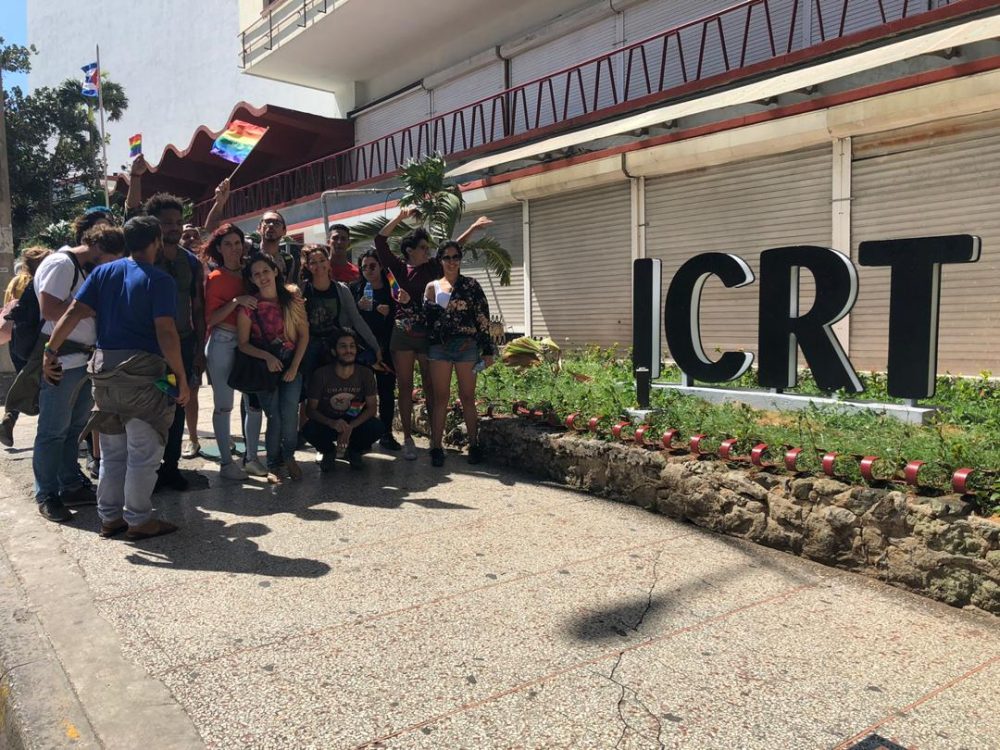Cuban Institute for Radio and Televsion censors same-sex kiss
On February 29, the Cuban TV program Pensando en 3D (Thinking in 3D) showed the film Love, Simon, which tells the story of a gay teenager who falls in love […]

On February 29, the Cuban TV program Pensando en 3D (Thinking in 3D) showed the film Love, Simon, which tells the story of a gay teenager who falls in love with a classmate. Over the course of the film, Simon learns to accept his sexual orientation and comes out as gay to his friends and family. Despite the film’s core message of acceptance, Pensando en 3D censored the climactic scene in which Simon, played by Nick Robinson, shares a kiss with Bram (Josh Duhamel).
Across social media, the Cuban LGBTI community expressed shock and indignation at this censorship. Activsts called for a public protest in front of the Cuban Institute for Radio and Television (ICRT, in Spanish), located in the Vedado neighborhood of Havana, on Sunday, March 1st. The “kiss-in” protest aimed to reject this stigmatization of LGBTI love, call for an apology from the Institute and demand another showing of the film without censorship.
Yadiel Cepero, an activist from Matanzas province, led the charge for the kiss-in and told Race and Equality that debate about the censorship and the LGBTI community’s demands took place across Cuban social media. As March 1st approached, several activists received threats of harm if they attended the protest. Despite these threats, and knowing that Cuban State Security would seek to break up the protest, LGBTI activists set out to assemble in front of the Institute.
Jancel Moreno, who planned to report on the kiss-in for Cuba’s independent media, was intercepted by two officers on the road to Havana. According to Moreno, “two men calling themselves Lieutenants Alejandro and David told me to come with them. They held me in a building off the road between Matanzas and Bacunayagua bridge for several hours to prevent me from reaching Havana.”
Also on Sunday, the activist and artist Luis Manuel Otero Alcántara, who was also preparing to attend, posted on social media: “I am surrounded by political police trying to prevent me from going to the kiss-in outside ICRT, but I’ll see everyone there!” His partner, the activist Claudia Genlui Hidalgo, was struck by police officers as she tried to prevent them from detaining Luis Manuel.
The same day, the ICRT posted a statement on their website apologizing for the censorship:
“In response to this mistake, a review was conducted with the employees who edited the scene. The omission of the scene did not stem from any homophobic positions on the part of the ICRT or the leadership of Cuban Television, as some have implied on social media.”
TheICRT also decided to re-broadcast the film next Saturday, with the kiss scene included. Energy for the kiss-in dispersed after the apology, but some activists chose to persist, stating that the protest was about more than the particular scene.
As the protest grew closer, LGBTI activist and director of the independent outlet Tremenda Nota Maykel González Vivero received a threat from a social media user calling himself Elpidio Valdés. The message read, “let’s see if you can even make it out of your cheap house.”
González Vivero, another independent journalist, wrote on his Facebook page that the kiss-in had been cancelled due to the ICRT’s apology, but others stated that ICRT leadership should be pushed to disseminate the apology over the airwaves. Around twenty activists eventually assembled in Vedado, where State Security and police officers were already waiting. Local buildings had also been decoated with Cuban flags and posters with Revolutionary imagery.
Cuba’s LGBTI community remains outraged at the censorship, which is merely the latest incident of Cuban TV programming giving offense to LGBTI people and members of racial minorities. We call upon the Cuban state to respect its internatinoal commitments to cease discrimination against LGBTI people among public officials and to educate all Cubans about the human rights of LGBTI persons.

